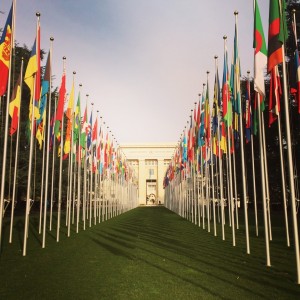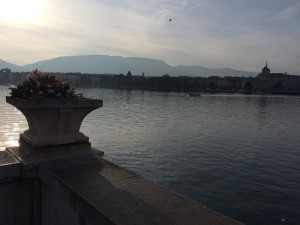Geography Department PhD student, Lara Langston, travelled to Geneva to attend the UNISDR Science and Technology Conference on the Implementation of the Sendai Framework for DRR, from the 27th – 29th of January 2016, using the Geography PhD Small Grant.
2015 was an important year for the agreement and implementation of a number of international frameworks that set goals to work towards sustainable development and poverty alleviation. The United Nations Office for Disaster Risk Reduction (UNISDR) implemented the Sendai Framework for Disaster Risk Reduction 2015 – 2030 in March 2015. The framework intends to promote a forward-looking, action orientated framework for disaster risk reduction (DRR) which reduces the impact of natural hazards, climate extremes and man-made hazards on people, but particularly those who are disproportionately exposed to disasters, such as the most poor, the vulnerable and the marginalised.
I was awarded a Geography PhD Small Grant to attend the UNISDR Science and Technology Conference on the Implementation of the Sendai Framework for DRR, from the 27th to the 29th of January, 2016. I used the grant to cover my accommodation in Geneva, Switzerland. As it is an expensive city, I would not have been able to afford to go without receiving this grant. I attended as part of the King’s College London Centre for Integrated Research on Risk and Resilience (CIRRR) team, alongside colleagues from the Building Resilience against Climate Extremes and Disasters (BRACED project), the Linking Preparedness, Resilience and Response (LPRR) project and the Urban Ark project. Our aim was to represent and promote the CIRRR centre’s research which focuses on bridging the gap between academia, science, policy and practitioners in relation to risk and resilience.
As a first year PhD student, I also wanted to use this as an opportunity to learn from and network with scholars and colleagues who work in areas related to CIRRR, and to my own research. My PhD is titled ‘Pro-poor development: Governmentality and the creation of resilient subjects’, and I will be specifically working on food security with settled pastoralists in Ethiopia.
As I come from a think tank research background, I am striving to ensure that my PhD contributes to the debate on the gap between academia, policy and practitioners, and I had many interesting and engaging discussions regarding methodological application, and relevance at the conference. As mentioned, bridging this gap is also something that CIRRR focuses on. Collectively, we aim to identify, address and look for solutions to problems, contributing to debates and gaps within the risk and resilience field. As a team, we not only discussed and presented our own research, but updated ourselves with the latest empirical data, and emergent research within the risk and resilience field. Whilst the conference was valuable on a personal level to shape and guide my thesis, the conference also helped shape the CIRRR teams positioning within the risk and resilience field.
Overall, the conference bought together the science and technology community, policy makers, practitioners and researchers from all geographical regions, across local and national, and regional and international levels in order to discuss how the science and technology community should support and contribute to the Sendai Framework. Bridging the gap between science and policy, alongside discussions of how to harness and upscale successful pilot projects in DRR, and how to enhance understanding and awareness of risk, were some of the questions posed and addressed throughout the conference. Attendance by people from diverse backgrounds, ranging from United Nations employees, Non-Governmental Organisation practitioners, development organisations, professors and PhD students, think tanks, and businesses and corporations fed into the discussions, highlighting the growing importance of the need to exchange ideas and knowledge, discuss best (and bad) practices, and share information. Whilst some progress was made, there is still a long way to go to find solutions to the questions that emerged, particularly regarding addressing the gap between science and policy. CIRRR will continue to work on research that addresses these problems, striving to find solutions and build capacity at all levels, from those who are at risk, to policy makers, and decision makers. On a personal level, attending the conference has enhanced my knowledge and stimulated questions for my own research, allowed me to network and make invaluable contacts, and built my confidence for future conferences where I could be either presenting my own research, or attending as part of the CIRRR team.
For further information, see Becky Murphy’s blog from the conference. Becky is lead researcher on the LPRR project at KCL and Capacity Building Officer at Christian Aid. Link:
For further information on CIRRR, please go to http://www.kcl.ac.uk/sspp/research/cirrr/index.aspx
All photos © Lara Langston
Lara Langston is a PhD Student in the Geography Department at King’s and a member of the Contested Development research group.

